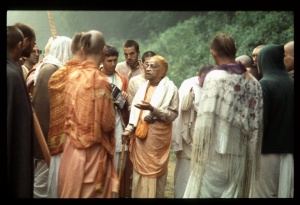CC Antya 6.217 (1975): Difference between revisions
(Vanibot #0027: CCMirror - Mirror CC's 1996 edition to form a basis for 1975) |
(Vanibot #0020: VersionCompareLinker - added a link to the Version Compare feature) |
||
| Line 2: | Line 2: | ||
<div style="float:left">'''[[Sri Caitanya-caritamrta (1975)|Śrī Caitanya-caritāmṛta (1975)]] - [[CC Antya (1975)|Antya-līlā]] - [[CC Antya 6 (1975)|Chapter 6: The Meeting of Śrī Caitanya Mahāprabhu and Raghunatha dasa Gosvāmī]]'''</div> | <div style="float:left">'''[[Sri Caitanya-caritamrta (1975)|Śrī Caitanya-caritāmṛta (1975)]] - [[CC Antya (1975)|Antya-līlā]] - [[CC Antya 6 (1975)|Chapter 6: The Meeting of Śrī Caitanya Mahāprabhu and Raghunatha dasa Gosvāmī]]'''</div> | ||
<div style="float:right">[[File:Go-previous.png|link=CC Antya 6.216 (1975)|Antya-līlā 6.216]] '''[[CC Antya 6.216 (1975)|Antya-līlā 6.216]] - [[CC Antya 6.218 (1975)|Antya-līlā 6.218]]''' [[File:Go-next.png|link=CC Antya 6.218 (1975)|Antya-līlā 6.218]]</div> | <div style="float:right">[[File:Go-previous.png|link=CC Antya 6.216 (1975)|Antya-līlā 6.216]] '''[[CC Antya 6.216 (1975)|Antya-līlā 6.216]] - [[CC Antya 6.218 (1975)|Antya-līlā 6.218]]''' [[File:Go-next.png|link=CC Antya 6.218 (1975)|Antya-līlā 6.218]]</div> | ||
{{CompareVersions|CC|Antya 6.217|CC 1975|CC 1996}} | |||
{{RandomImage}} | {{RandomImage}} | ||
==== TEXT 217 ==== | ==== TEXT 217 ==== | ||
| Line 18: | Line 17: | ||
<div class="synonyms"> | <div class="synonyms"> | ||
ei-mata—in this way; sarva-kāla—for all time; | ei-mata—in this way; sarva-kāla—for all time; ache—is; vyavahāra—the etiquette; niṣkiñcana bhakta—a devotee who has no other support; khāḍā haya—stands; siṁha-dvāra—at the gate known as Siṁha-dvāra. | ||
</div> | </div> | ||
Latest revision as of 03:07, 27 January 2020
Śrī Caitanya-caritāmṛta (1975) - Antya-līlā - Chapter 6: The Meeting of Śrī Caitanya Mahāprabhu and Raghunatha dasa Gosvāmī

His Divine Grace
A.C. Bhaktivedanta Swami Prabhupada
A.C. Bhaktivedanta Swami Prabhupada
TEXT 217
- ei-mata sarva-kāla āche vyavahāra
- niṣkiñcana bhakta khāḍā haya siṁha-dvāra
SYNONYMS
ei-mata—in this way; sarva-kāla—for all time; ache—is; vyavahāra—the etiquette; niṣkiñcana bhakta—a devotee who has no other support; khāḍā haya—stands; siṁha-dvāra—at the gate known as Siṁha-dvāra.
TRANSLATION
Thus it is a custom for all time that a devotee who has no other means of support stands at the Siṁha-dvāra gate to receive alms from the servants.